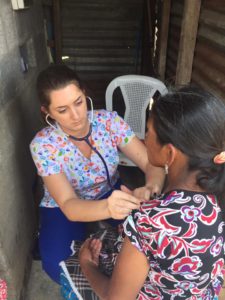Student Experience
Skilled nurses are in high demand
The Bachelor of Science in Nursing degree program at the Pembroke Campus helps meet the ever-increasing demand for skilled nurses. According to Algonquin College’s recent Graduate Employment Reports, over 90% of our Nursing graduates were employed within six months of graduation.
Work in local health-care facilities
Students in BScN program benefit from clinical experiences in some of the top health-care facilities in the province, including a newly expanded Pembroke Regional Hospital, Miramichi Lodge, Marianhill, and Bonnechere Manor.
Other placement opportunities are available throughout the Ottawa Valley through the College’s partnerships with the Deep River Hospital, St. Francis Memorial Hospital in Barry’s Bay, Renfrew Victoria Hospital, Arnprior and District Hospital, the North Renfrew Long-Term Care facility, and other smaller long-term care operations. One of the major advantages of studying nursing in a smaller community is the wonderful learning opportunities students experience through real-life nursing experiences.
In a recent nationwide review of health services in Canadian communities, MacLean’s magazine ranked Pembroke fourth in Canada out of 415 municipalities for best communities with health care. Read the Best communities in Canada for great health care 2019 article.
Train on the latest equipment
The use of technology provides our students with the training tools and realistic hands-on practice that they need to prepare for their clinical experiences at health-care facilities throughout the Ottawa Valley. Our recently renovated nursing lab features modern health-monitoring equipment used in today’s hospitals and simulated patients that can be programmed with a variety of medical symptoms.
Students also have the opportunity to collaborate with students from other programs during an Interprofessional Mock Critical Incident Training Exercise on campus. Our students in the Bachelor of Science in Nursing, Environmental Technician, Police Foundations, Applied Nuclear Science and Radiation Safety, Practical Nursing, Personal Support Worker and Social Service Worker experience what it’s like to work collaboratively in a mock emergency situation. This exercise looks very real with student actors playing the role of victims, while other students actively participate as first responders to an emergency situation. Experiential learning at its best!
These videos were produced before the onset of the COVID-19 Pandemic. It reflects a campus life that is currently altered to ensure the health and safety of our students and employees. We are currently following all protocols as outlined by our public health authorities.
Gain insight through health research
Students in the BScN program have been recognized nationally for their work to improve health care in Canada, and some have presented their research at national conferences in Toronto and Edmonton. Through their Health Research: Quantitative and Qualitative Approaches course, students gain insight into the importance of research and how to collect, collate, analyze and interpret health data, before taking on research projects within the community. Students can also participate in research at the University of Ottawa and other health-care organizations.
Explore the world with international humanitarian opportunity
Students and faculty have travelled to Guatemala to provide health care and education to children and adult population, with a focus primarily on kids.
Students focus on the following five areas:
-
 Working with Guatemalan doctor: Students performs an overall assessment including vital signs and create a plan for that individual. This is a challenge as the doctors are fluent in Spanish so our students not only are working on their practical skills but are working on how to communicate with a new language.
Working with Guatemalan doctor: Students performs an overall assessment including vital signs and create a plan for that individual. This is a challenge as the doctors are fluent in Spanish so our students not only are working on their practical skills but are working on how to communicate with a new language. -
Hand washing: Students teach the locals how to wash hands along with the importance of washing hands (reducing parasite infections) along with when we need too. Students demo and get kids to perform. Again, language is the biggest issue but there is a storybook that our translator and facilitator created to help this process.
-
Parasitic medicine and vitamins: Students teach the importance of parasitic medicine and vitamins and then provide and teach how to take.
-
Tooth brushing: Students teach kids regarding safe dental care along with how to brush teeth.
-
Pharmacy: Students need to sort and organize trough medications (in Spanish) and provide to patients after they have been assessed by the doctor.